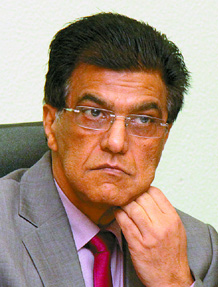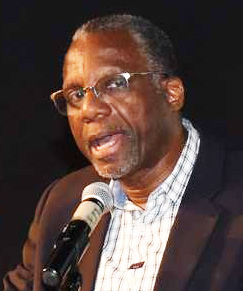Trinidad & Tobago
Judge pressured to resign?

Port-of-Spain – Ramesh Lawrence Maharaj, attorney for former chief magistrate Marcia Ayers-Caesar, maintained last week his client may have been pressured to resign as a High Court judge.
Maharaj said Ayers-Caesar’s resignation letter was prepared for her by officials at the Hall of Justice, adding all she had to do was sign the letter. Maharaj said based on the Constitution, a judge could only be removed through a genuine letter of resignation, or the findings of the tribunal appointed by the President.
Declaring procedure was not followed, this meant the actions of the Judicial and Legal Services Commission, which is chaired by Chief Justice Ivor Archie, were null and void. Therefore, Ayers-Caesar remains a judge, Maharaj maintained.
It meant yet another question needed to be answered, Maharaj said: “Whether a letter of resignation of the judge, prepared by officials at the Hall of Justice for her signature and signed in the Hall of Justice by the judge, could have any legal effect having regard to the facts and the circumstances of this matter. Could the JLSC by virtue of this letter have purportedly removed the judge?”

Maharaj said if the JLSC does not take steps to allow Ayers-Caesar to continue as a judge, then she can challenge that decision and seek compensation from the State. This has been done before, he said. He intimated if Ayers-Caesar decides to challenge the State, he would undertake that responsibility, and is prepared to take it to the Privy Council to prove her rights were violated.
Although Prime Minister Dr Keith Rowley said the government would not get involved, Maharaj said if he was an Attorney General he would have written to Archie asking him to reconsider the JLSC’s position.
Maharaj also said if Ayers-Caesar had numerous incomplete cases in the Magistrate’s Court, there was nothing in law to prevent her from completing those matters. He said a judge holds a higher position in the judiciary, meaning Ayers-Caesar would have had a higher jurisdiction to complete outstanding matters.
He also noted the JLSC’s press release on March 22 mentioned several cases Ayers-Caesar had dismissed. This was not relevant to the issues, and could have prejudiced the minds of the public against her, Maharaj said. It was not uncommon for matters to be dismissed for want of prosecution or an abuse of process, he noted.

Meanwhile, Ayers-Caesar was last week reported to be “up and around, and is coping as best as she can”. However, sources told the media she remains “deeply hurt” by the controversy.
Ayers-Caesar has maintained her silence since the controversy started, even in the wake of the statement by Chief Justice Ivor Archie and the JLSC blaming her for the situation. This is the first time Ayers-Caesar has been embroiled in a controversy.
“Marcia has guarded her name and reputation and has been deeply affected by the situation, and extremely hurt by the JLSC’s statement. What they have done is destroy a human being. She is now unemployed and unemployable, because this matter has gone far and wide. She cannot get a job in the region,” a close source told the media last week.
“She is deeply rooted in the Catholic faith and this has helped her considerably. She has been going to church and has been praying, but I can tell you she took it hard. She is a decent person and did not deserve this,” the source added.
Another colleague told the media: “If I was consulted on this matter I would have told her straight up not to resign.”
The colleague said while the CJ claimed to have been “misled”, a chief magistrate always has some of the most serious high profile cases, so the JLSC must have raised the issue. The colleague added Ayers-Caesar was not the kind to lie to advance in her career, but was straight-up and straightforward.
“I don’t believe that she did not inform the CJ. He himself erroneously referred to some of the matters as paper committals, when he should have known better. She was deeply hurt by the statement from the Chief Justice on the evening of April 27th when she tendered her resignation. It was destructive and hit her at the core,” the source added.
Despite her resignation, Ayers-Caesar continues to have the security detail assigned to her through a risk that arose during a matter she was dealing with in the courts.
So far, several senior attorneys have pledged to attend a special general meeting of the Law Association to take place on June 1 to deal with the issue.
He mounted a successful legal challenge which has expanded access to citizens to challenge perceived violations of non-human rights provisions of the Constitution.
“That he had to pursue the case, at his own expense I presume, as far as the Judicial Committee of the Privy Council in London is unfortunate,” Mahabir-Wyatt said.
She added: “If we recognised the Caribbean Court of Appeal, he could have done it in Port-of-Spain but that access was denied to him. For a citizen, in the public interest, to ask for a legal interpretation of a clause in the Constitution is surely the most fundamental of human rights in a country that respects the rule of law based on the principles of democracy. Justices Peter Jamadar, Nolan Bureaux, and Geoffrey Smith certainly thought so when the matter came before them.”
She hailed the Privy Council’s ruling as a historic one with repercussions for the entire Commonwealth to consider as it establishes a citizen’s right to seek an interpretation of the Constitution of the country in which a citizen lives.
President of the Law Association Douglas Mendes also commended the ruling, saying it affirmed “in no uncertain terms” the role of the Supreme Court as guardian of the Constitution and protector of the rule of law.
Dumas had challenged the appointment of Dr James Armstrong and Romar Achat-Saney to the Police Service Commission by the President in 2013.
His challenge can now be decided by the local court. The Law Lords in their ruling said the case raised “an important question about the jurisdiction of the High Court to hear an application by a citizen for the Court to interpret a provision of the Constitution.”
The appellate court and the Privy Council had found that there was no established tradition in Trinidad and Tobago which prevented a citizen with a legitimate interest in upholding the Constitution and the rule of law. In their ruling, the British Law Lords also held that the question raised by Dumas was one for the court to decide.
TT $8B shortfall

Among this sum, she said were $6.3 billion in revenues not realised, a $.5 billion shortfall from the recent additional public offering of shares in FCB, plus some $0.5 billion in Property Tax that she said it is unrealistic to expect the government to be able to collect this year.
Saying the country has about 400,000 households, she said the mere 51 valuation surveyors registered at the Institute of Surveyors are insufficient to do all these assessments of Property Tax due.
“I can’t see any way he (Finance Minister Colm Imbert) will get the 180 to 240 valuators needed to evaluate the property tax,” Persad-Bissessar said.
She also responded to Imbert over which government ran up the public debt the most. She said the former People’s Partnership had moved the figure from $45.4 billion (in 2010) to $76.5 billion (in 2015), but compared to this five-year period, the People’s National Movement had taken the debt to $89.1 billion in just 18 months.
“Is this sustainable, the debt-to-GDP ratio? We really are on the edge of a cliff. The Minister gave us no policy, no programme to get out,” she said.
Persad-Bissessar bemoaned that much of Trinidad and Tobago’s Public Debt was accrued by external borrowing, meaning its repayment must be by way of foreign exchange, which is now in short supply.
“You (Imbert) diagnosed the problem but have not said what is the medicine to get us out of recession,” she said.
Saying Imbert has not ordered the cutting of items, she asked how he would balance the books, such as by more drawdowns from the Heritage and Stabilisation Fund.
While Moody’s had hit the government for failing to diversify the economy, she wondered whether it now intends to try to literally “pay” another credit rating agency, Fitch, to get a good rating?
Regarding TSTT’s purchase of Massy Technologies, she refused to believe this deal was not known of beforehand by either Prime Minister Dr Keith Rowley or Minister in the Office of Prime Minister Stuart Young, even as TSTT chairman Emile Elias claimed not to have told Cabinet.
She wondered how Corporation Sole, Finance Minister Colm Imbert, could not know of this quarter billion dollar expenditure ($255 million) even as the country reels from a lack of medicines in public hospitals and a lack of water supply.
She criticised the government’s diversion of $2.5 billion from the Infrastructure Development Fund as “scandalous”. Regarding the status of the Procurement Regulator, Persad-Bissesar said she would like to see the reported letter from President Anthony Carmona that had purportedly requested government help to recruit this official.
Irwin was left nursing second degree burns to his back after bandits doused him with boiling water. The couple returned to Florida late last week.
A police report stated that at 8 am on May 10, the couple was at home on Southern Main Road, La Romaine when two masked men entered and announced a hold-up. They were robbed of cell phones and (TT) $750. According to reports, the robbery turned violent when the couple resisted the bandits.
The bandits bound the victims’ hands and feet with tie straps, tore pieces from a blanket and gagged Judy before making them lie on the floor. One bandit threw a pot of boiling water down Irwin’s back.
Irwin was rushed to the San Fernando General Hospital where he was treated and later discharged. With his neck heavily bandaged, he said he was in fear of his life and would not speak with the media. A female relative however spoke on his behalf.
“What shocked me about this is that they (Seenaths) don’t go out anywhere, they don’t draw attention to themselves and they are not flashy. I am surprised that they were targeted like that,” the relative said.
“People must know how dangerous crime is here. You read it in the papers and you think it wouldn’t affect you, but it happens and it is really bad. I hope they catch the persons,” she noted.
Said the relative: “Imagine one of them whispered instructions to ransack the house. When they didn’t get what they wanted, they tied them up with those tie straps, cut a blanket and gagged his wife and put them on the ground and then threw the hot water down Irwin’s back. All his neck was burnt. He was burnt pretty badly. Right now, I am telling you, they don’t think they will ever come back Trinidad.”
Police have made no arrests.
exchange situation

Giving his comments during an armchair discussion at the first instalment of the Chamber of Commerce’s Economic Transformation Series, “Is Oil and Gas Smothering the Private Sector in Trinidad and Tobago?”, Farrell agreed with Ronald Hinds, chamber president, that the institution of what appeared to be informal controls in distributing forex was a “slippery slope.”
Farrell said banks were responsible for selling foreign exchange to the public, while the Central Bank’s job was to disburse that foreign exchange to the market. He pointed out that the Minister of Finance was telling the Central Bank to tell the commercial banks they must prioritise manufacturers.
“What is a banker to do? Corruption is going to enter into that. I have told my colleagues at Republic Bank precisely that. The Bankers Association of this country should have told the Central Bank, told the Ministry of Finance, ‘We are not prepared to do exchange controls for you.’ But they have not said that. And they are going to get themselves in a lot of trouble, the bankers are going to get themselves in a lot of trouble. Because customers are going to say, ‘You are favouring that one,’ and it is going to open us up to a royal mess,” Farrell said.
He noted the float system put in place in 1993 was more than enough to manage forex without exchange controls.
“What we are doing now is re-introducing exchange controls. They do not work. They cause corruption, they cause problems,” he said.
Two of the actions seek to have the courts review the implementation process of the controversial tax while the third is a constitutional challenge to the Property Tax. In the judicial review and constitutional claims former transport minister Devant Maharaj, United National Congress activist Ravi Balgobin Maharaj, and Chaguanas resident Lutchmidat Ramcallie, are asking the government to hold its hand on the implementation of the Property Tax until it amends the legislative provisions, and before the court determines the actions.
The government was given until this week to respond otherwise the three will approach the courts with legal challenges.
In the constitutional claim, which will be argued by a team of attorneys led by Senior Counsel Avory Sinanan, Ramcallie says it appears the government was simply motivated to seek as much money as it could by collecting property taxes as opposed to collecting the taxes according to law.
Sinanan and his team have asked the government to reconsider the manner in which it is seeking to implement property taxes and repeal the unconstitutional provisions of the Property Tax Act. In their challenge, the group argued they felt the public has been ambushed by the government and the haste with which it has moved to implement the tax in flagrant disregard of the enshrined fundamental rights and freedoms guaranteed by the constitution. They say this means the government has been prepared to sacrifice the rule of law on the altar of political expediency. The group is represented by a team of attorneys led by former attorney general Anand Ramlogan, SC.
Ramlogan contends that under the 2009 Act, the deadline for the filing of any Valuation Return Form was April 1, 2010. He is arguing if citizens failed to do so by that time, the commissioner had six months to forewarn them they could be prosecuted for non-compliance.
Ramlogan said no amendment was made to the Act, and as such, the State cannot simply impose a new deadline for the filing of the VRF.
“April 1, 2010, having come and gone, the only power which the commissioner has under Section 6 is the power under Section 6 (2) to call upon the owner ‘to file a return failing which he may be liable to conviction under this section’. Thus, the Commissioner will effectively be seeking to forewarn about the risk of and/or initiate criminal prosecution some seven years after the grounds for same arose and some six and a half years after the deadline for doing so expired under section 33 of the Summary Courts Act. This is plainly untenable,” Ramlogan said.
He added: “The government cannot impose the property tax without a lawful assessment and hence the mad rush to do so for the sake of raising much needed revenue from a financially beleaguered public without reference to the rule of law is reminiscent of the proverb, ‘The way to hell is paved with good intentions.’”
He stressed the Finance Minister could not simply bypass Parliament and impose a new deadline without amending section 6 adding “This is a most serious violation of the most basic and elementary principles of constitutional law.”
invasion problem
The ministry said it was being aggressive with ridding the pests in those areas affected. "As part of our aggressive pest-management strategy, our locust team has been conducting daily reconnaissance to identify nest beds and roosting locations to allow for targeted spraying operations to eliminate the numbers of this pest that mature and take flight. Additional staff have been deployed for these spraying operations, commencing duties as early as 5 a.m. until 6.30 p.m., and working on weekends," the ministry said.
"We have also collaborated with the Princes Town and Penal/Debe Regional Corporation to assist with spraying operations. We have also hosted public awareness sessions with the Forestry Division and general forest users to sensitise them of the locust situation and to ensure that they are partners with us when and if they sight locusts to allow for us to have an effective spray response time," it added.
Residents have been marooned in their homes as a result of the swarms flying around their neighbourhoods and farmers' gardens.
The ministry stated areas have been sprayed on multiple occasions over the past six months, including Saunders Trace, Edward Trace, Texaco Road off Edward Trace, Hollick Trace, Moruga Food Crop Project La Savanne, St Mary's, Grand Chemin, Cachipe Village, Boisjeanjean, Cumuto Road in Barrackpore, Poui Road, Penal Rock Road, Trial Link Road, Moreau Road, Marac Village, Rasta Trace, La Ruffin, and Bonyon Trace, among others.
The ministry said it has acquired a new-model cannon sprayer, a heavy-duty sprayer, along with the equipment currently being used.
Local government councillor for Moruga Joseph Lorant said the regional corporation is working closely with the Agriculture Ministry to address the locust issue.
"At present, due to our vision as a corporation to improve the quality of life to the general public, we have partnered with the Ministry of Agriculture and Insect Vector Division to assist in addressing the current locust issue, which requires a collaborative approach to rectify the situation in a timely manner and ensuring those affected get timely relief through routine spraying activities early on mornings and late at evenings," he said.
